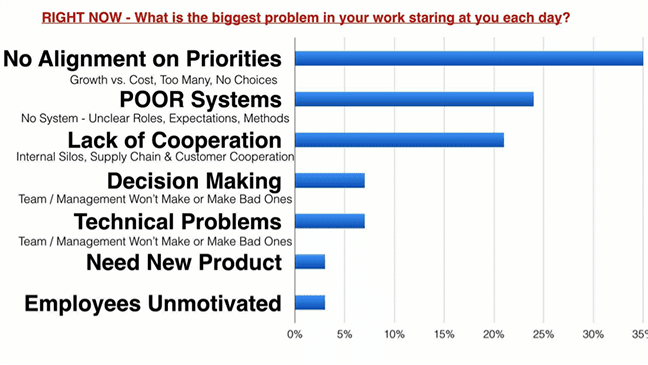In both informal surveys and more rigorous data samples, corporations today report their greatest problems arise from internal issues. In particular, three challenges — alignment, systems and cooperation — top the list of a number of executives across multiple industries. In contrast, decision making, technical problems, innovation and unmotivated employees are far down that same list.

In this Age of Innovation, organizations are confronted with the need to simultaneously manage stability and flexibility, and they do so by strengthening their coordination and collaboration systems. In other words, as complexity increases in today’s workplaces so does the need for greater coordination and collaboration. Coordination systems enable everyone in the organization to identify, understand and act on relevant priorities without attempting to be everything to everybody. Building the shared understanding, agreements, and actions necessary for success are where the collaboration systems become instrumental.
In my own work of facilitating collaborative organizational design or redesign, what is fundamental is laying the groundwork for what I call Deep Collaboration — everyone designs, decides and leads where appropriate. The required groundwork involves the whole organization deciding what governing principles, shared purpose and shared values will be their guiding lights. All present and future decisions (strategic and operational) are then bound by these parameters. In the case where “people, planet and prosperity” emerges as part of those parameters, forthcoming initiatives must bring favourable and equitable outcomes for all three Ps — a win-win-win.
In order for people to master the complexity of contemporary organizational life, everyone directly affected by the decisions and actions taken must be directly involved in formulating them. The complexity required to do this overwhelms most traditional leaders. However, when people are given responsibility for engineering their own success as well as that of the whole collective, they not only master what is required but also are highly committed in their efforts. In contrast, how can a CEO and executive suite of leaders know the individual priorities of all their people and then align these within the organization in order to ensure that what is good for all is actually achieved?
The Innovation Age has evolved not only the complexity of work but also the nature of work from routine and linear — producing widgets — into knowledge advancement. As a work output, knowledge advancement emerges from the shared understandings, agreements and enhanced perspectives of deep collaboration with others. Primarily, deep collaboration complements human intelligence and diversity rather than supplanting both with a technology-based collaboration platform wherein people often become the arm of the technology rather than the reverse being true.
Deep collaboration necessitates participants willing hold many points of view in their search for knowledge and value creation. Influencing or coercing outcomes to move in one direction or another is not considered additive. Thus, “power flexing” serves no purpose, and frankly is a skill that has no value in today’s workplace.
I suspect the significance of this last statement is obvious in that organizations traditionally have been structured around power/authority and accountability. It must then be no surprise why the surveyed executives, mentioned at the beginning of this blog, see cooperation as a major challenge.
Power-flexing does not support a cooperative culture where everyone needs to work together. However, collaborative design by those directly impacted does indeed support and bring about alignment on priorities and well-designed coordination systems. Furthermore, the design work of organizations needs to ensure their structures and systems no longer reflect power-based accountabilities.
For more on human-centred design and humane workplaces, click here.





